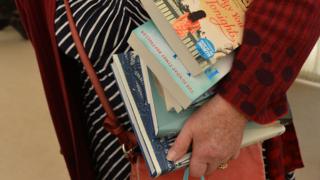- 9 January 2016
- From the section [url=/news/magazine]Magazine[/url]

Thank you so much for watching! Remember to follow me on social media (links below) to stay up to date on what I'm reading! Get a free audiobook!

Image copyright
PA
Agatha Christie read 200 books every year, while Facebook founder Mark Zuckerberg gets through a book a fortnight. President Theodore Roosevelt read a book a day, and increased this to two or three when he had a quiet night. But how can mere mortals get through more?
Harriet Klausner - a school librarian who died last year - was either one of history's greatest speed-readers or someone somewhat economical with the truth.
Klausner clocked up a staggering 31,014 Amazon book reviews, sometimes reading six books a day. But not everyone could accept that feat, with a group of critics forming to debunk her claims.
The speed-reader defended herself by pointing out that some of the romance novels she reviewed were so short and simple they could be polished off in an hour. And Klausner offered a simple explanation for her enthusiasm: "If a book doesn't hold my interest by page 50, I'll stop reading," she told the Wall Street Journal.
Image copyright
PA
Klausner's achievements may seem to be in the realm of fantasy but many of us do wish we could read more. Finish more books. Cram in more knowledge. Appreciate more literature.
Distracted by TV box sets, football matches and Twitter trends, we seem to find it increasingly difficult to fit reading into our lives.
John Sutherland is an author, book critic, columnist and emeritus Lord Northcliffe Professor of Modern English Literature at University College London.
In 2015 he read approximately 150 books.
"Quite a lot," he suggests, "probably as many books as I had hot dinners." Using a tablet enables Sutherland to skip through pages at lightning speed. "That way you don't have to rely on a dampened forefinger - and the risk of giving the next reader tuberculosis," he laughs.
Image copyright
Alamy
A professional reader's livelihood depends on their ability to race through words. Last year Sutherland finished a new book approximately every 2.4 days. "I turn four pages at a time if I have to," Sutherland says, "whereas most people like to enjoy their reading. Even I tend not to read more than one book a day… unless there is a gun pointed at my head."
The time it takes to read a book, particularly a dense classic like War And Peace, currently the basis for a relatively brief BBC TV adaptation, can be off-putting.
Image caption
The BBC's War And Peace adaptation - 1,000 pages, or six hours on TV?
As a schoolboy, Tony Buzan was given a secret speed-reading test. He was pleased with his score of 213 words per minute. "I thought, wow, I must be a pretty fast reader. But then I asked a girl in my classroom and she had scored over 300. I was crushed."
Buzan decided to improve his skills. He practised speed-reading at home and researched the physics of the eye, as well as learning about fixation (also known as eye focus) and chunking (grouping words together so they can be read as a single chunk).
Buzan discovered that he could read more quickly after physical exercise. Before long, he had doubled his reading speed.
Now a speed-reading and memory consultant, Buzan believes the number of books we read is important. "Instead of reading, say, 1,000 books in my lifetime," he tells me, "I might now read 2,000. And that could change my life."
Tony Buzan's tips for reading quickly
Image copyright
PA
- Learn how to use your eyes to read faster
- Become physically fit, to give your brain more oxygen
- Learn how to memorise chapters and even whole books
- Read about the brain and its workings
- Form a speed-reading and studying team with friends
If you take the often-cited average reading speed of 300 words a minute, the average reader might take about one minute to get through a page. To get through a 300-page novel a day, the reader would have to set aside 35 hours a week.
"There are only so many books I can read in my lifetime and I am not going to waste my time on rubbish," protests columnist and Sunday Times book reviewer Jenni Russell. She thinks we become more selective with age.
"When we are young we have an intense curiosity about other people, how they think and feel, their psychology. Now a writer has to have exemplary skill or insight to hold my attention." As a child, Russell read as many as 20 books in a week. Now she reads three a month.
What is the best way to approach a year of reading?
"My advice is to get bored," says John Sutherland. "My early life was very boring. Reading was a good way of filling in great tracts of tedious time."
Russian revolutionary Leon Trotsky also capitalised on boredom. During two years in prison he read from morning until night, tackling classic European fiction, Darwin's studies and Lenin's theories of communism.
--
※ 作者: ott 時間: 2016-01-26 16:30:17
※ 編輯: ott 時間: 2016-03-04 15:06:05